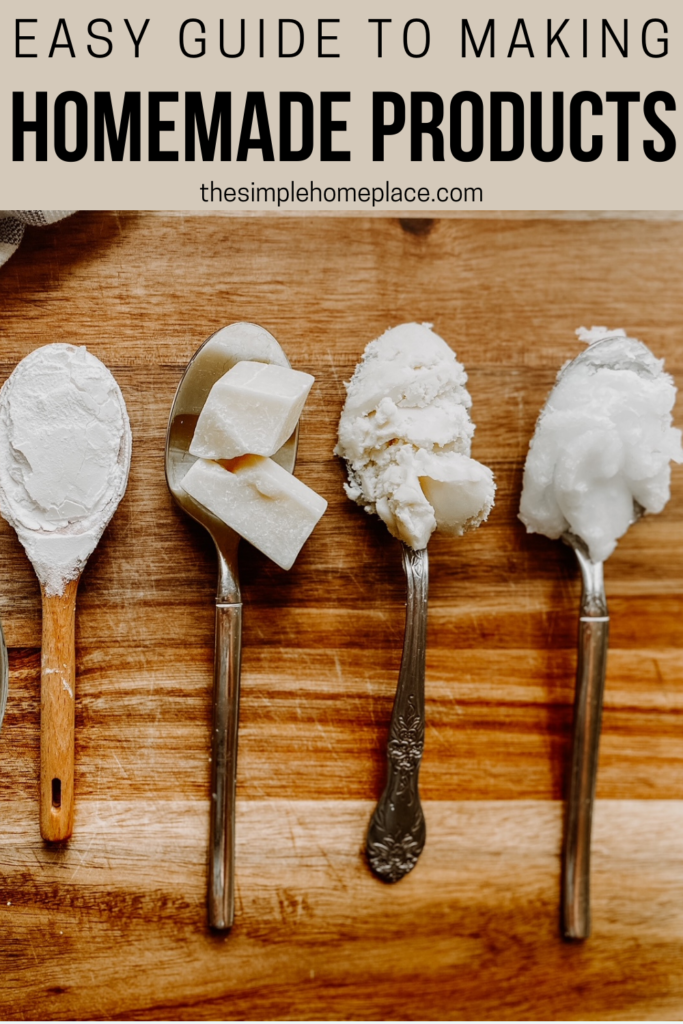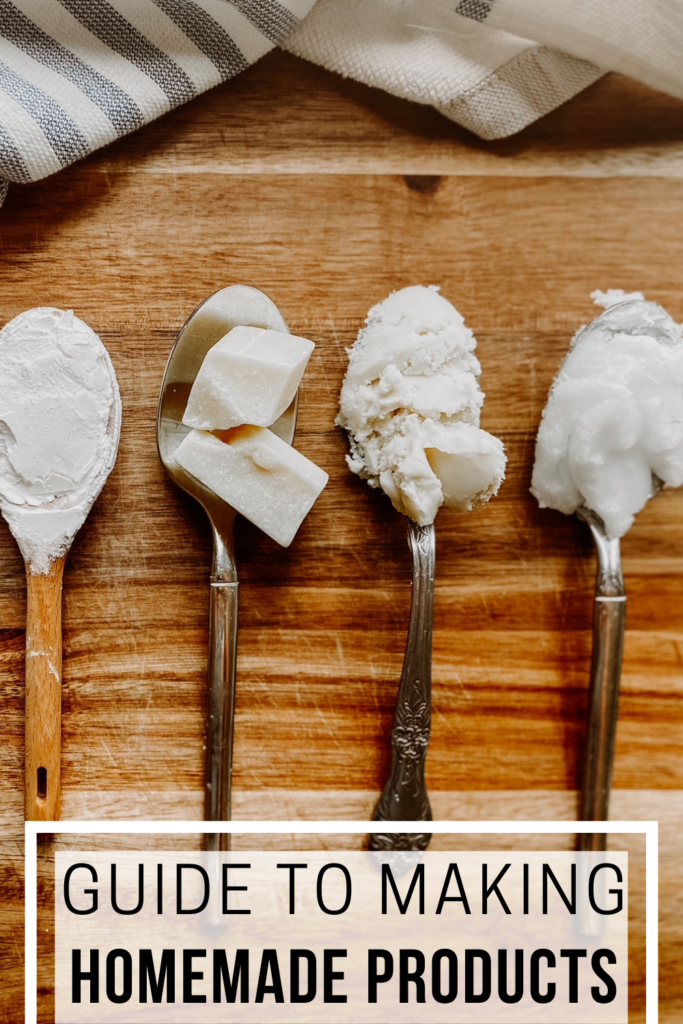Making homemade products for your home not only can save you money, but it’s also healthier for you and your family. If you’re on a mission to have a toxin-free home, making your own homemade products can help you achieve that goal! You only need a handful of versatile ingredients to begin!

Over the past year, I’ve been on a mission to clean up the products my family and I use. Although I’ll probably never rid my home of every single bad-for-you ingredient or product, I know that I can continue to take the right steps to eliminate the bulk of them. If you’ve ever thought about moving to cleaner (pun intended) household products, but don’t know where to start, I hope this post helps! It can sound overwhelming, but really, you only need a handful of inexpensive ingredients to begin making your very own homemade products! Here are a few I’ve made so far that I love: DIY Dry Shampoo, Homemade Body Wash, DIY Charcoal Face Mask, Homemade Laundry Detergent. If you’re new to the world of homemade household products, this beginner’s guide should help set you on the right path!
PIN FOR LATER!


WHY MAKE YOUR OWN HOMEMADE PRODUCTS?
Many products you buy from the big box stores include ingredients such as formaldehyde, fragrances, phthalates, parabens and more. These types of ingredients can disrupt hormones and can also be carcinogenic. Here’s an article with more information on some ingredients to avoid. Aside from reducing exposure to nasty chemicals, making your homemade products for the home saves money, is better for the environment and requires very few ingredients. Most ingredients that you need to make your own homemade products are really inexpensive and readily available. See below for a full list of ingredients to get you started!
INGREDIENTS TO GET YOU STARTED
Below is a list of simple ingredients that can get you started on your path to removing toxic chemicals from your home. Click on each one to find out more about the ingredient and what it can be used for!
- Baking Soda
- Washing Soda
- Fels-Naptha Soap
- Vinegar
- Rubbing Alcohol
- Hydrogen Peroxide
- Castile Soap
- Butters
- Coconut Oil
- Carrier Oils
- Waxes
- Essential Oils
BAKING SODA
Baking soda is an extremely versatile ingredient and can be used not only for making delicious chocolate chip cookies and other goodies, but for cleaning and even a bit of skincare! At a price of less than 70 cents per pound, baking soda is an ingredient you should always have on hand. For cleaning purposes, baking soda can help deodorize, remove stains, clean and polish cookware and so much more. For the body, it can be used to help whiten teeth, treat heartburn, act as a mouthwash. Here are just a few homemade products you can make for your home using baking soda as one of the ingredients:
- Homemade laundry detergent
- Deodorant
- Carpet deodorizer
- Dishwasher detergent
- Face and body exfoliator
- Toilet bowl cleaner
- Garbage can deodorizer
- Mouthwash
WASHING SODA
Washing soda is found in many of the same cleaning products that baking soda is, and it can easily be made from baking soda. I’ve had a hard time finding it in my local stores, so making my own is a great solution. Simply spread baking soda onto a lined pan and bake for one hour at 400 degrees Fahrenheit, and wa-la, you have washing soda!
FELS-NAPTHA SOAP
Fels-naptha soap isn’t as versatile as some of these other ingredients, but it is now essential in my natural laundry routine. It is fantastic at removing stains and is used to make the homemade powder laundry detergent that I use. Often times, you can find it at a price of less than $1 per bar, and one bar will last you for at least 6 months, but probably a year if you’re using it strictly for stain removal. A whole bar also goes into making a large quantity of laundry detergent. It’s a great, cheap alternative. Although fels-naptha soap isn’t 100% free of chemicals, it’s a better alternative, for me anyway.
VINEGAR
Vinegar can be used to clean several surfaces of the home including counters, showers, glass and more! It’s an excellent all purpose cleaner, and although it’s not a disinfectant, it’s great for every day use! Here’s a few ways it can be used:
- Fabric softener
- Dishwasher rinse aid
- All purpose cleaning spray
- Window cleaner (Windex alternative)
- Coffee maker cleaner and de-scaler
- Soap scum remover
- Stain remover
- Jewelry cleaner
RUBBING (ISOPROPYL) ALCOHOL
Rubbing alcohol can be used as a way to sanitize surfaces and objects in the home. Read more here for information on using alcohol to sanitize. Although I don’t typically use rubbing alcohol on large surfaces in my home, I love to have it on hand for smaller surfaces and things like sanitizing tweezers or similar items. Here are a few ways you can utilize rubbing alcohol in your home:
- Disinfecting your phone
- Cleaning and disinfecting countertops
- Disinfecting nail clippers and tweezers
- Removing ink from surfaces and fabric
HYDROGEN PEROXIDE
Like rubbing alcohol, hydrogen peroxide can disinfect surfaces. According to the CDC, “Hydrogen peroxide is active against a wide range of microorganisms, including bacteria, yeasts, fungi, viruses, and spores.” Hydrogen peroxide can be used in similar ways to rubbing alcohol as well!
CASTILE SOAP
Castile soap is derived from vegetable oils, like coconut oil, and is a natural, biodegradable and super versatile. It is also gentle and great for those with sensitive skin. Castile soap is not only great for homemade skincare products, but you can also use it in cleaning products as well! Here are just a few ways you can use castile soap:
- Homemade body wash
- Hand soap.
- Bubble bath
- Dish soap
- All-purpose cleaner
- Fruit and veggie wash
- Shampoo
SHEA BUTTER, COCOA BUTTER AND/OR MANGO BUTTER
If you want to make your own body care products shea butter, cocoa butter and/or mango butter are essential. You can buy all or one of these butters, and although they are among the more expensive ingredients, a little can go a long way, so they should last you a while. These butters are hydrating for your skin and can help calm skin irritations. They also can be used in hair care products as well. Here are just a few things you can make with any one of these butters:
- Body butter
- Body lotion
- Lotion bars
- Chapstick
- Deodorant
- Mascara
- Hair mask or conditioner
- Sunscreen
- Sugar scrubs
- Shaving Cream
- Soap
COCONUT OIL
Unrefined coconut oil (solid at room temperature) has many uses and benefits. It has health benefits like helping raise your good cholesterol (HDL) levels when ingested, and is a great addition to homemade skin care products. It helps hydrate and protect the skin and hair. You can add it to several recipes including:
- Body butter
- Lip balm
- Lotion bars
- Makeup remover
- Homemade deodorant
CARRIER OILS
Carrier oils are oils typically used to dilute essential oils to make them less harsh on the skin and hair. They also help essential oils be applied to larger sections of the body and aids in deeper penetration into the skin. You can also use carrier oils by themselves, as they are great moisturizers for the skin and have several other benefits as well. Below are a few of the most commonly used carrier oils, but there are several others that you can use as well.
- Fractionated Coconut Oil:(liquid at room temperature) is perfect for use in roller bottle blends, as well as an ingredient in products like homemade body wash and face wash.
- Jojoba Oil: Jojoba oil is a wonderful oil that is great for the skin. It closely resembles the natural oils our skin produces (sebum), contains vitamin E, is hypoallergenic and won’t clog your pores. It’s mostly commonly used in face oil blends.
- Olive Oil: Olive oil is great for the skin because it contains several vitamins, including A and E, and is very moisturizing. It also works great as a makeup remover, especially for waterproof mascara.
- Sweet Almond Oil: Sweet almond oil is moisturizing, anti-inflammatory and can help with many skin issues including acne and sun damage.
BEESWAX OR VEGAN ALTERNATIVES
Beeswax or vegan alternatives like carnauba wax can be added to homemade products like chapstick, lotion bars, balms and more to help them hold their shape. You can also use beeswax and/or soy wax to make your own candles!
ESSENTIAL OILS
Although essential oils are always optional, they do add many benefits and beautiful fragrance to your homemade household products. Some of my favorites are lavender, peppermint, sweet orange, lemon and tea tree. As always, do your own research on essential oils and always use pure (organic if you can) oils. If you’ll be using them on your skin, it may be a good idea to do a small patch test to make sure you don’t have a reaction to that specific oil.






FINAL THOUGHTS
My best advice to cleaning up your home and making homemade household products is to start slow. When you run out of dishwasher detergent, try making your own. Then, when you run out of laundry detergent, make your own and so on and so forth. Even swapping one product for something natural and homemade is a win. You don’t have to spend a lot of money to do that. I hope this post helps you. If you start making some of your own products, I’d love to hear about it!





Leave a Reply